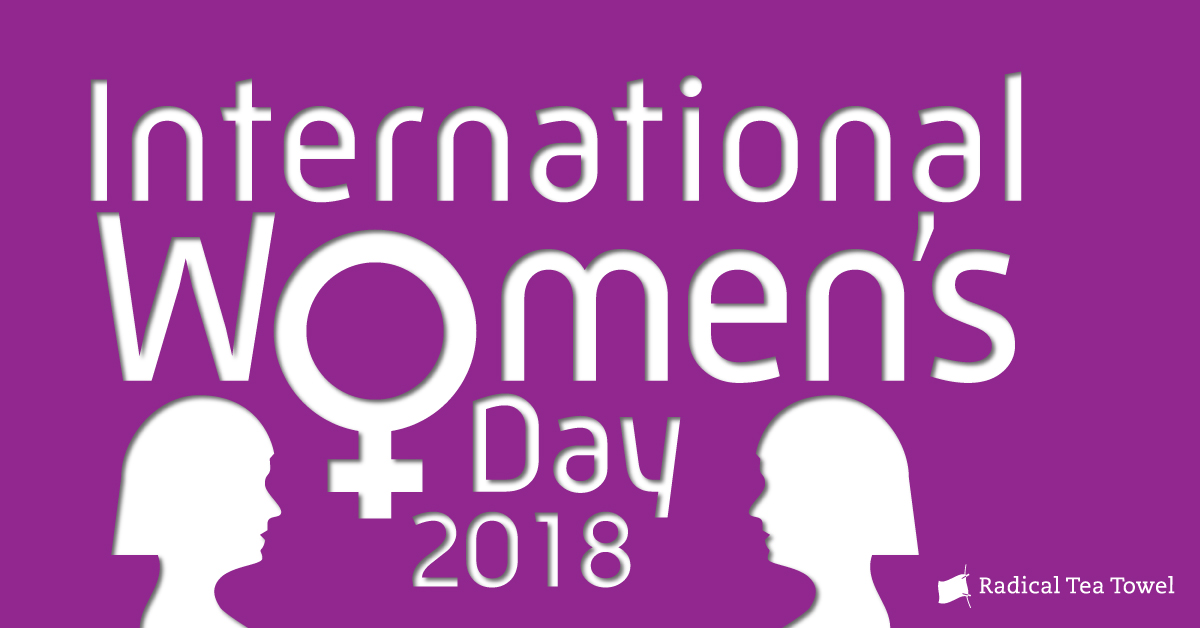International Women's Day: Two Women Who Should Not Be Forgotten
Posted by Pete on 8th Mar 2018
First things first: Happy International Women's Day!
Secondly: it's worth noting that I'm not a woman… Which might lead some to ask why I'm the one writing today's blog.
There's the mundane fact that Radical Tea Towel is a small business and I'm the guy responsible for writing the blogs.
But there's also the higher reason that, if we're to achieve the post-patriarchal world that International Women's Day is aiming for, we're not going to do it by limiting the history of each gender to historians of that gender.
If anything, guys like me, who for centuries have been allowed to see the history of our own gender as a historical full-stop, should be writing about women more and more.
In reality, I'm just transcribing the thoughts of smarter people today, because the two stories I have for you are stories passed on to me by two women in my own life.

A likely hero in an unlikely time
The first story is of Lyudmila Pavlichenko. I read about her in a book called 'The Unwomanly Face of War' by Svetlana Alexiyevich which my sister, Siobhan, gave me.
Pavlichenko was a Soviet historian born in modern Ukraine in 1916.
I say 'historian', but that's not exactly what she's best known for.
She actually suspended her history studies at the University of Kiev in 1941. Why? The Nazis had just invaded the Soviet Union and Pavlichenko was leaving to volunteer for the Red Army.
She would soon become one of the highest scoring snipers in history. Fighting at Odessa and Sevastapol, she recorded 309 kills over the course of just two years.
Wounded by a shell in June 1942, Pavlichenko was withdrawn from the front line and sent on a propaganda tour of the Western allied states to use her growing fame to stir up popular support for the Soviet war effort.
She went to Birmingham, Coventry, Toronto, Washington DC, New York.
One day, she was talking to a massive crowd in Chicago. Seeing how many men were present, she berated them with the line:
"Gentlemen, I am 25 years old and I have killed 309 fascist invaders by now. Don't you think, gentlemen, that you have been hiding behind my back for too long?"
Did you ever see that 2001 film about the Soviet Sniper, 'Enemy at the Gates'? We're not keen on celebrating deaths at Radical Tea Towel, but it does make you wonder, what if they'd chosen a woman lead instead?
Returning to Russia, Lyudmila Pavlichenko finished the war with the rank of Major and having been awarded the Hero of the Soviet Union – the USSR's highest military honour – twice.
A feminist writer not to be forgotten
To get from Pavlichenko's Russia to the second story I want to tell requires a bit of travelling.
Sailing out of the Black Sea and then striking west across the Mediterranean, you'll eventually come to the Algerian seaport of Cherchell where, in 1936, a girl was born called Fatima-Zohra Imalayen.
But she's now better known by her pen name, the name with which she became the first North African admitted to the Académie Française: ‘Assia Djebar’.
I wouldn't have heard of Djebar by any name if she wasn't the subject of my mate Annie's very-nearly-finished dissertation!
In her 79 years, Djebar wrote over fifteen books, including novels, poems, and plays.
An impassioned feminist and anti-colonialist, Djebar fought French colonialism and then Algerian patriarchy in her homeland.
She worked to amplify Algerian women in the country's history – "to resurrect so many vanished sisters" - where before their role and experience had been rubbed out or distorted by French and Algerian historians alike.
You may have noticed a common thread between the stories of Assia Djebar and Lyudmila Pavlichenko: from the desert shores of Algeria and the frosty coast of the Black Sea,
neither woman was a Westerner.
Making women's day international
Having celebrated the tale of British feminism a month ago with the centenary of the Representation of the People Act, International Women's Day is a handy reminder that the struggle for gender equality – and the connected fights against fascism, colonialism, and capitalism – is a global one.
At Radical Tea Towel, we already acknowledge this with designs like Maya Angelou, Rosa Luxemburg, and Rosa Parks, and we want to do more.
It won't be long before Sojourner Truth – the African American abolitionist – has a design of her own, and she'll be joined in our gallery by many other international women, so watch this space!
Browse our designs from Constance Markievicz to Emma Goldman
